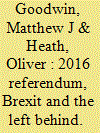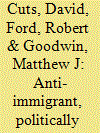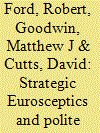|
|
|
Sort Order |
|
|
|
Items / Page
|
|
|
|
|
|
|
| Srl | Item |
| 1 |
ID:
149204


|
|
|
|
|
| Summary/Abstract |
Why did Britain vote for Brexit? What was the relative importance of factors such as education, age, immigration and ethnic diversity? And to what extent did the pattern of public support for Brexit across the country match the pattern of public support in earlier years for eurosceptic parties, notably the UK Independence Party (UKIP)? In this article we draw on aggregate-level data to conduct an initial exploration of the 2016 referendum vote. First, we find that turnout was generally higher in more pro-Leave areas. Second, we find that public support for Leave closely mapped past support for UKIP. And third, we find that support for Leave was more polarised along education lines than support for UKIP ever was. The implication of this finding is that support for euroscepticism has both widened and narrowed—it is now more widespread across Britain but it is also more socially distinctive.
|
|
|
|
|
|
|
|
|
|
|
|
|
|
|
|
| 2 |
ID:
103364


|
|
|
|
|
| Publication |
2011.
|
| Summary/Abstract |
The elections to the European Parliament (EP) held in June 2009 marked a breakthrough for the extreme right British National Party (BNP), while in other European states extreme right parties (ERPs) similarly made gains. However, the attitudinal drivers of support for the BNP and ERPs more generally remain under-researched. This article draws on unique data that allow unprecedented insight into the attitudinal profile of ERP voters in Britain - an often neglected case in the wider literature. A series of possible motivational drivers of extreme right support are separated out: racial prejudice, anti-immigrant sentiment, protest against political elites, Euroscepticism, homophobia and Islamophobia. It is found that BNP support in the 2009 EP elections was motivationally diverse, with racist hostility, xenophobia and protest voting all contributing significantly to BNP voting. The analysis suggests that the BNP, which has long been a party stigmatised by associations with racism and violent extremism, made a key breakthrough in 2009. While racist motivations remain the strongest driver of support for the party, it has also begun to win over a broader coalition of anti-immigrant and anti-elite voters.
|
|
|
|
|
|
|
|
|
|
|
|
|
|
|
|
| 3 |
ID:
111505


|
|
|
|
|
| Publication |
2012.
|
| Summary/Abstract |
While Euroscepticism is the most important driver of United Kingdom Independence Party (UKIP) support, other attitudinal drivers - namely dissatisfaction towards mainstream parties and xenophobia - are also important. Examining vote-switching between first- and second-order elections evidence is found of a distinction between two types of supporter: more affluent and middle-class 'strategic defectors' from the mainstream Conservative Party who support UKIP to register their Euroscepticism, and more economically marginal and politically disaffected 'core loyalists' who are attracted to UKIP by its anti-immigration rhetoric and populist anti-establishment strategy. UKIP also succeeds in attracting core support from groups such as women who have traditionally rejected extreme right parties such as the British National Party (BNP). This suggests that UKIP is well positioned to recruit a broader and more enduring base of support than the BNP.
|
|
|
|
|
|
|
|
|
|
|
|
|
|
|
|
|
|
|
|
|